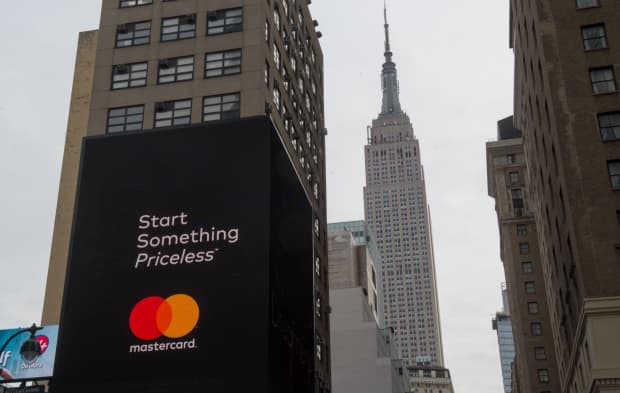This post was originally published on this site

Mastercard is working with governments on real-time payments networks leveraging technology gained through its 2017 Vocalink acquisition.
AFP via Getty Images
Mastercard Inc.’s next chief executive sees a big opportunity beyond credit cards as the company pushes deeper into real-time payments that run independent of the traditional card rails.
The company announced Thursday that its Vocalink product was selected to handle settlement and clearing for Canada’s new real-time payments system, called the Real-Time Rail. Real-time payments make use of bank-account or other financial credentials to move money but operate at a quicker speed and with the ability to transfer more transactional data than traditional automated-clearing house (ACH) rails.
Canada joins the U.K., the U.S., and Thailand, among other countries leveraging Mastercard’s MA, -0.71% Vocalink for various uses in real-time payments. The work in Canada highlights that “recognizing payments as critical national infrastructure” is an important aspect of Mastercard’s strategy, said Michael Miebach, the company’s current president who is set to take over as chief executive at the start of 2021.
While cards have been the backbone of Mastercard’s business for decades and remain critical today, Miebach said that the company wants to have “all options on offer,” meaning the ability to connect any payer to payees, regardless of whether the parties are using cards, bank accounts, mobile wallets or other forms of payments.
Mastercard acquired Vocalink in 2017 in an attempt to get a bite of the large volume of money flowing on ACH rails. Many business-to-business payments, as well as some recurring consumer transactions, bypass credit cards and instead rely on bank information. By getting more of a footing in business-to-business payments, Mastercard sees a market opportunity several times larger than that for retail payments.
The company is in the process of acquiring the account-to-account business of Danish payment-technology company Nets. When Mastercard announced its plans to purchase Nets in August 2019, Miebach said the deal would make Mastercard a “more relevant partner for banks” and other payment players.
See also: Mastercard scoops up open-banking company Finicity amid big digital push
When it comes to working with governments, there’s a sense that cards are already fairly established. “What governments are looking for is not more cards,” Miebach told MarketWatch this week, but rather broader forms of payment technology that can help tackle more localized issues, like financial inclusion.
While there’s always concern in the payments universe that countries will increasingly become “nationalistic” in their pursuit of financial goals, cutting out established players, Miebach said that Mastercard’s diversified payments offerings can help the company offer more targeted options to countries seeking to solve a particular issue in their payments infrastructure.
“No one wants to be nationalistic,” but rather they’re trying to solve something, he argued.
Among Miebach’s priorities when he assumes the chief executive position is ensuring that Mastercard strikes a balance between being global and being local when working with governments. “We have to recognize what their needs are and not try to push product, but build real solutions for them,” he told MarketWatch.
Don’t miss: Government is partnering with big banks, fintech to speed payments to Americans
In Canada, because Mastercard is involved in the infrastructure of the company’s new real-time payments system, it has “a seat at the table” that Miebach said will enable the company “to engage in the financial services sector to develop the right kinds of applications.”
Mastercard technology also supports the real-time payment network operated by The Clearing House in the U.S., and Miebach said that the financial industry “is putting more and more tests in” as the network builds out. The Federal Reserve is working on its own real-time service, suggesting to Miebach that real-time payments are “going to be a big part of payments in the U.S.”
Other priorities for Miebach include a continued focus on geographical diversification. He said that his background working in “truly emerging markets” showed him the value of being able to build payments capabilities in countries where Mastercard isn’t inhibited by existing solutions.
Separately, the company has received in-principle approval from China to start a domestic business there through a joint venture. Miebach expects the company will be able to participate in domestic payments there in 2021.
Mastercard shares have gained 11.3% so far this year as the S&P 500 SPX, +0.76% has risen 10.6%.

